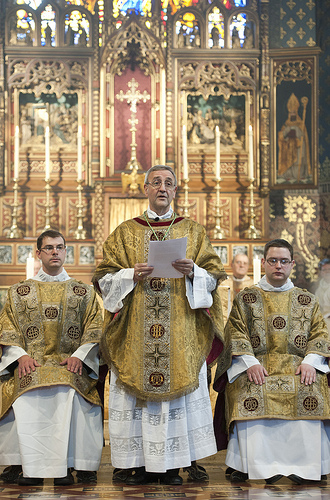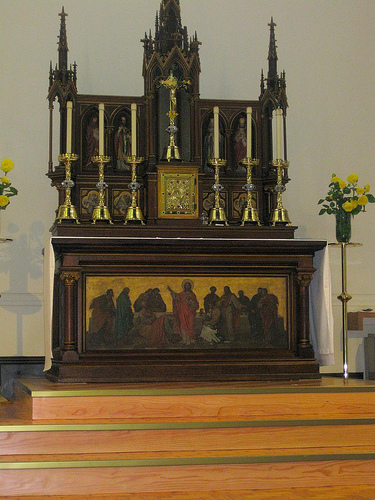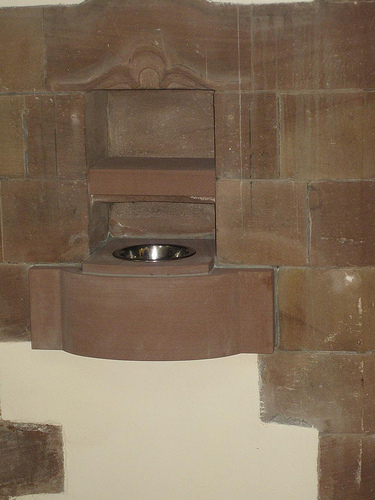Fr Langridge has sent me news of the Invocation 2011 vocations discernment conference that was held at St Mary’s College, Oscott, Birmingham, on Trinity Sunday, June 19. The conference was attended by the Apostolic Nuncio to Great Britain, Archbishop Antonio Mennini, bishops and priests from across the dioceses, together with event speakers and members of the seminary staff at the college.
The Nuncio celebrated the concluding Mass and wore the gold vestments and the pectoral cross used by Bishop William Bernard Ullathorne OSB, the first Bishop of Birmingham, who was installed in 1850 and who retired in 1888. The chalice used during the Mass was a gift from Pope Benedict to St Mary’s College, during his visit last year, when he addressed the Bishops of England, Scotland and Wales in the college chapel.
In his homily at the concluding Mass, His Excellency reminded the young people of the importance of Adoration of the Blessed Sacrament:
I should like to commend to you the practice of Eucharistic Adoration which you have experienced during this weekend of discernment. Adoration draws us away from external distractions into a growing communion with Jesus present in the Blessed Sacrament.
Encourage your friends to join you in this practice. In Eucharistic Adoration, whatever our personal circumstances, we are drawn out of ourselves towards the Sacramental Presence of Christ who came so that we might have life.As the representative of the Holy Father in Britain, His Excellency also conveyed the Apostolic Blessing.
In his homily on the Saturday evening, Bishop Mark Davies said:
Our Holy Father Pope Benedict speaking in London’s Hyde Park on that unforgettable day last September said: “Dear young friends: only Jesus knows what “definite service” He has in mind for you. Be open to his voice resounding in the depths of your heart: even now his heart is speaking to your heart … Ask our Lord what he has in mind for you!” And to do this he invited us to join him in meeting Christ, “present among us in the Blessed Sacrament of the Altar,” in those silent moments of adoration many of us will long remember. It is, of course, no coincidence that Christians celebrate marriage, ordination, the promises of consecrated life not in a hired hotel or a distant holiday resort but before the Altar, the place of the Eucharist where we could say with St. John: “This has taught us love – that he gave up his life for us; and we too ought to give up our lives for our brethren” (I John 3:16). For that is what every Christian vocation asks of us that we are drawn into the dynamic of the loving Sacrifice of Christ made present now for us in the Mass.Along with the above photo, you can see more photos at the Flickr set of Mazur/catholicchurch.org.uk. They provide a powerful witness that young people today are attracted not by an ephemeral attempt to mimic the culture of the world in an ecclesiastical setting but by the genuine and distinctive presentation of the Catholic faith with confidence, linked to the devout and reverent celebration of the Mass and of devotion to the Blessed Sacrament.
Let us pray for vocations to the priesthood and the religious life as the fruit of such excellent initiatives as Invocation.















































